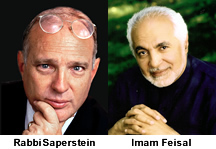
The role of theUnited Statesin promoting peace in theMiddle Eastwill be the topic of a presentation Wednesday (Oct. 26) from7:30to9 p.m.in McKenna Hall at the University of Notre Dame.
When Faiths Unite: Religion and U.S. Policy Toward the Israeli-Palestinian Conflictwill bring together American religious leaders who represent the Jewish, Muslim and Christian faiths to discuss the challenges and opportunities involved in finding common ground on the issue of peace in the Middle East.
Sponsored by the Kroc Institute for International Peace Studies, the Center for Social Concerns, Department of Theology, and Campus Ministry, the presentation is free and open to the public.
Speakers are:
- Rabbi David Saperstein, director of the Religious Action Center of Reform Judaism.Also an attorney, Saperstein is a lobbyist who represents the national Reform Jewish Movement to Congress.He serves on the boards of several organizations including the NAACP and People for theAmerican Way, teaches church-state law and Jewish law atGeorgetownUniversity, and is author of several articles and books.
- Imam Feisal Abdul Rauf, founder and CEO of the American Society for Muslim Advancement, and Imam of Masjid Al-Farah, a mosque in New York City.He is a member of the National Interreligious Leadership Initiative for Peace, the World Economic Forums Council of 100 Leaders, and the Board of Trustees of the IslamicCenterofNew York.He is author of several books, includingIslam: A Search for Meaning,Islam: A Sacred Law,and his most recent,Whats Right with Islam: A New Vision for Muslims in the West.He recently participated in the first Notre Dame Forum.
p. Also on Wednesday, at12:30 p.m.in theHesburghCenterauditorium, Imam Feisal will deliver a lecture titledHealing the Divide Between Islam and the West,based on his latest book.A book signing will follow the presentation.
- Ronald Young, founder and executive director of the U.S. Interreligious Committee for Peace in the Middle East, and organizer and author of the National Interreligious Leadership Initiative for Peace in the Middle East. Young has written and lectured widely on interfaith cooperation and has arranged meetings with high-levelU.S.andMiddle Eastofficials.He previously served as Middle East representative for the American Friend Service Committee (AFSC), National Peace Education Secretary for the AFSC, and is author ofMissed Opportunities for Peace: U.S. Middle East Policy.
TopicID: 14082